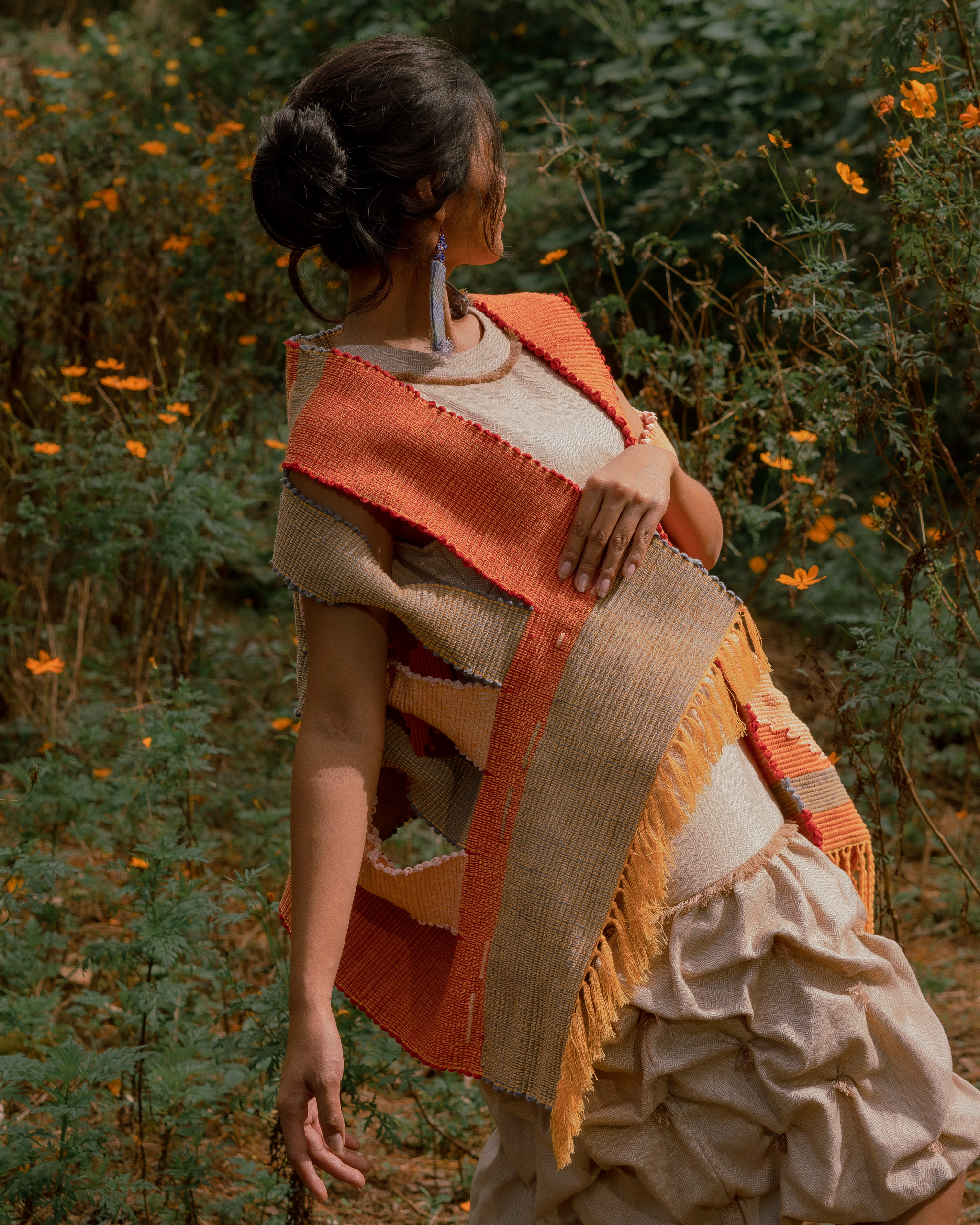Photo by Artu Nepomuceno
The newly-launched space promotes heritage, sustainability, and family through the support of local communities and use of artisan-crafted textiles in their bespoke creations.
Filipino clothing brand Bayo has promoted ethical and sustainable fashion through #JourneytoZero, the brand’s initiative to transform their production chain from linear to circular, ensuring traceability along the way. Their latest foray champions soil-to-garment production while promoting the preservation of local design traditions: the opening of Bayo Atelier, a design showcase featuring local handcrafted fabrics, uniquely Filipino designs and custom creations with the goal of pushing forth intentional fashion.
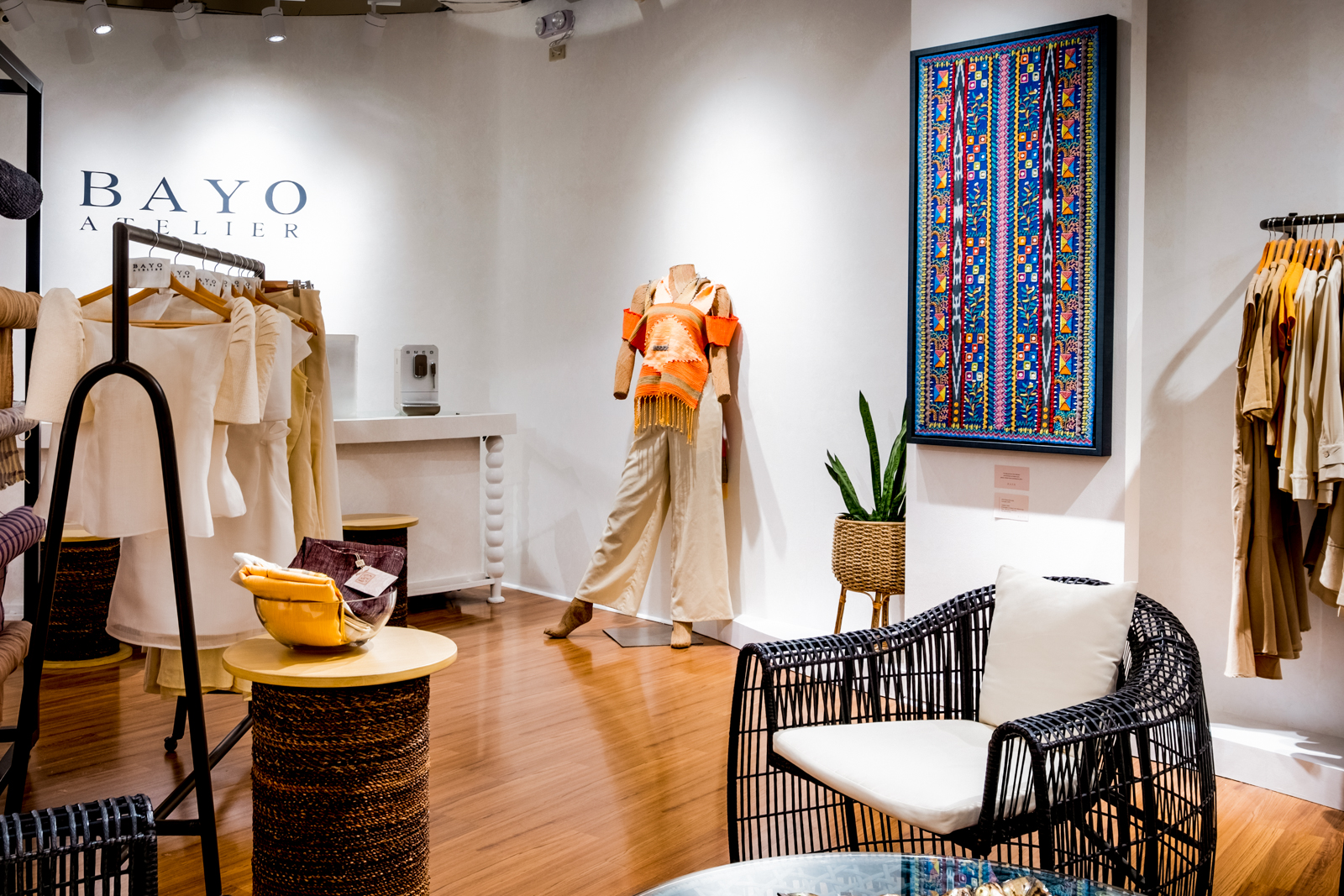
Supporting Local Communities
“It was actually built on the need that we saw through our community engagements. We’re always busy doing community support for different artisans, and we found out that there is a gap with everything that we do,” shares Bayo co-CEO and creative director Anna Lagon in Vogue Philippines’ exclusive first look at Bayo Atelier. “How do we sustain the livelihood if there’s no market available?”
The communities Lagon is referring to are from the HARVEST CommUNITY Hub in Baguio, their creative hub for collaborations between weavers, designers, and artisans from the local community, as well as communities in Bulacan that the brand has been working with since 2018. Other communities and weavers included are from Aklan and Misamis Oriental.
“When we realized that the work of the artisans needs a place to go to just so we can continue giving them weaving works, then we had to create that permanent space,” she says.
Lagon and her team decided to convert one of their existing stores into what is now Bayo Atelier at Greenbelt 5. This choice, according to Lagon, was because they were seeking out “people who are willing to listen to your story and buy pieces that are meaningful to them.”
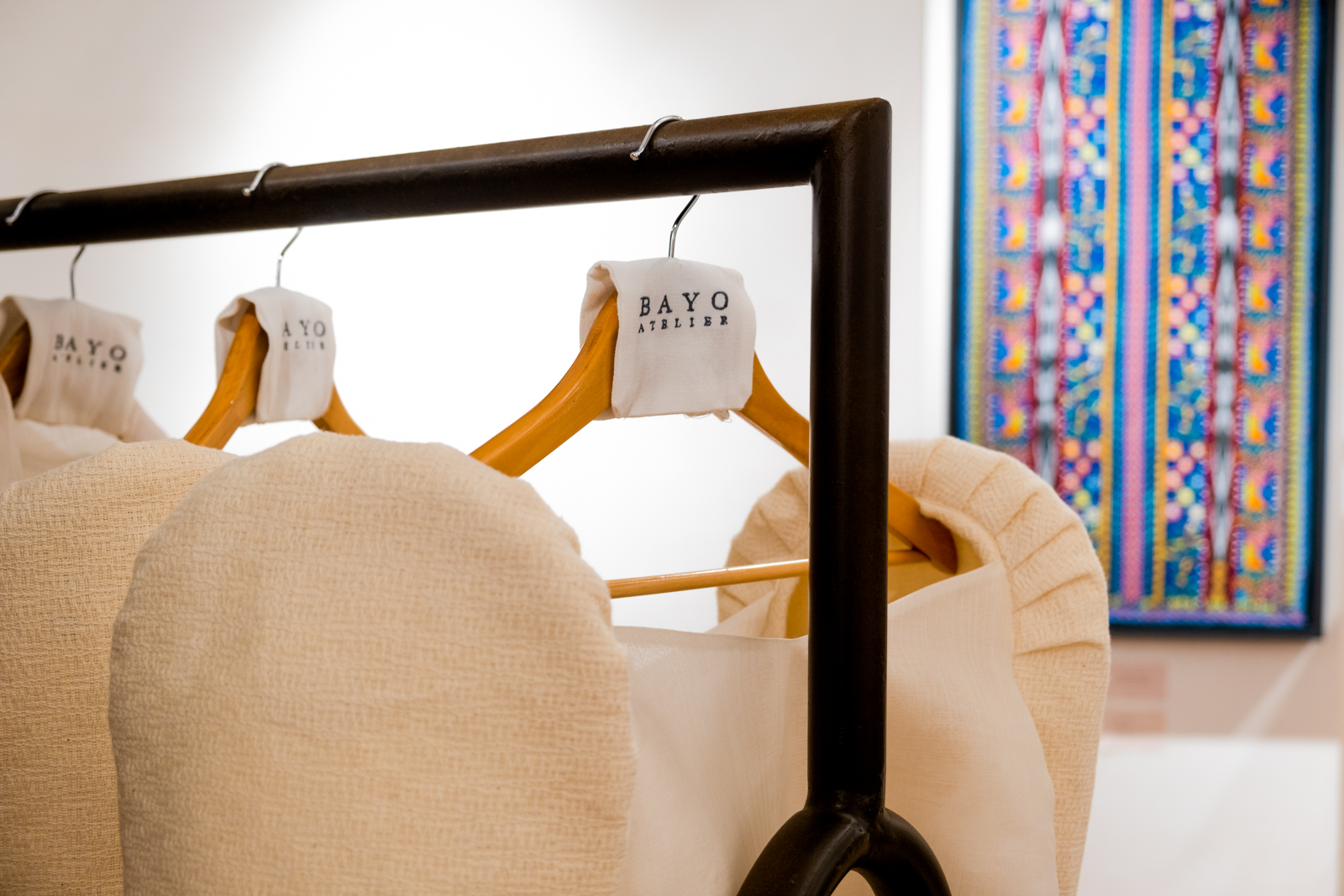
Greeting customers at the doors of the atelier is a mannequin made of Bakong, the regenerative fabric that Bayo Foundation discovered and developed in collaboration with the Design Center of the Philippines. According to Lagon, the mannequin expresses the intention that the customer is not entering an ordinary retail fashion store. “There is a story right at the entrance talking about the heritage of design. And so you can see that custom-made pieces are offered here,” she says.
Draped garments featuring modern takes on Filipino garments are hung around the store, a choice Lagon says they made to stay true to the Bayo brand. “Bayo has been known to be a homegrown Filipino brand. And to carry over Bayo, and then putting under it the Atelier, to us is another version of the brand but paying homage to the heritage,” she explains.
On the walls are handwoven fabrics with labels including the name of the artisan who crafted the fabric, the community from which it was sourced, and the materials that were used.
“The composition is very important to us because we really trailblazed the sustainability angle in the fashion industry, specifically for the local market,” elaborates Lagon. “We are really pushing so hard so that we can influence more people to consider using sustainable materials.”
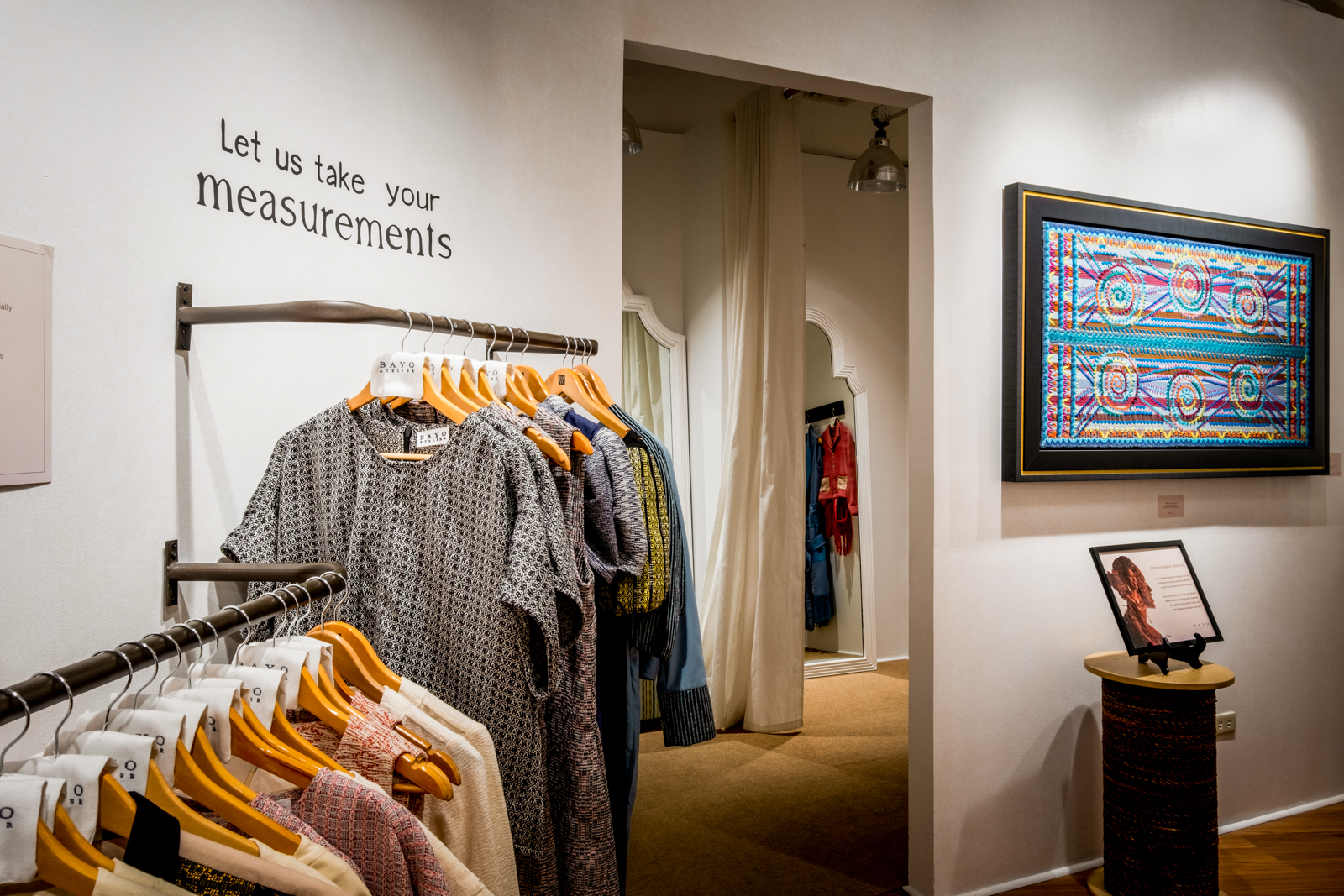
Culture, Family, and Heritage
Apart from using locally produced fabric in their custom pieces, Bayo Atelier also offers other local products. Guests who come in for a custom design and fitting will be treated to their free coffee, with beans sourced and roasted from Bansalan, Davao del Sur. Hung on their walls are framed woven artwork pieces by Kalinga designer Irene Bawer-Bimuyag, whose work is also being sold in the store.
“We are not just a place for clothes, but also a place to express art, but using threads always, like consistently to create our own different stories. But it all boils down to heritage, sustainability, and family,” Lagon says.
Bayo creative marketing head Meg Manzano reveals that they chose to offer bespoke modern interpretations of heritage designs because the fashion-forward market gravitates toward more conversational pieces. “If they were able to share the story of ‘Oh okay, this came from Baguio, like the handwoven textile’ or ‘I designed this,’ they’re a little more invested in it when they have a hand in the creation process,” she says.
More importantly, they want people to take care of the custom pieces as investments for the future generation. “That’s’ what we also hope to have, is for them to create future heirlooms, something that you love so much and then when your daughter comes of age, it’s something that you can pass on,” she shares.
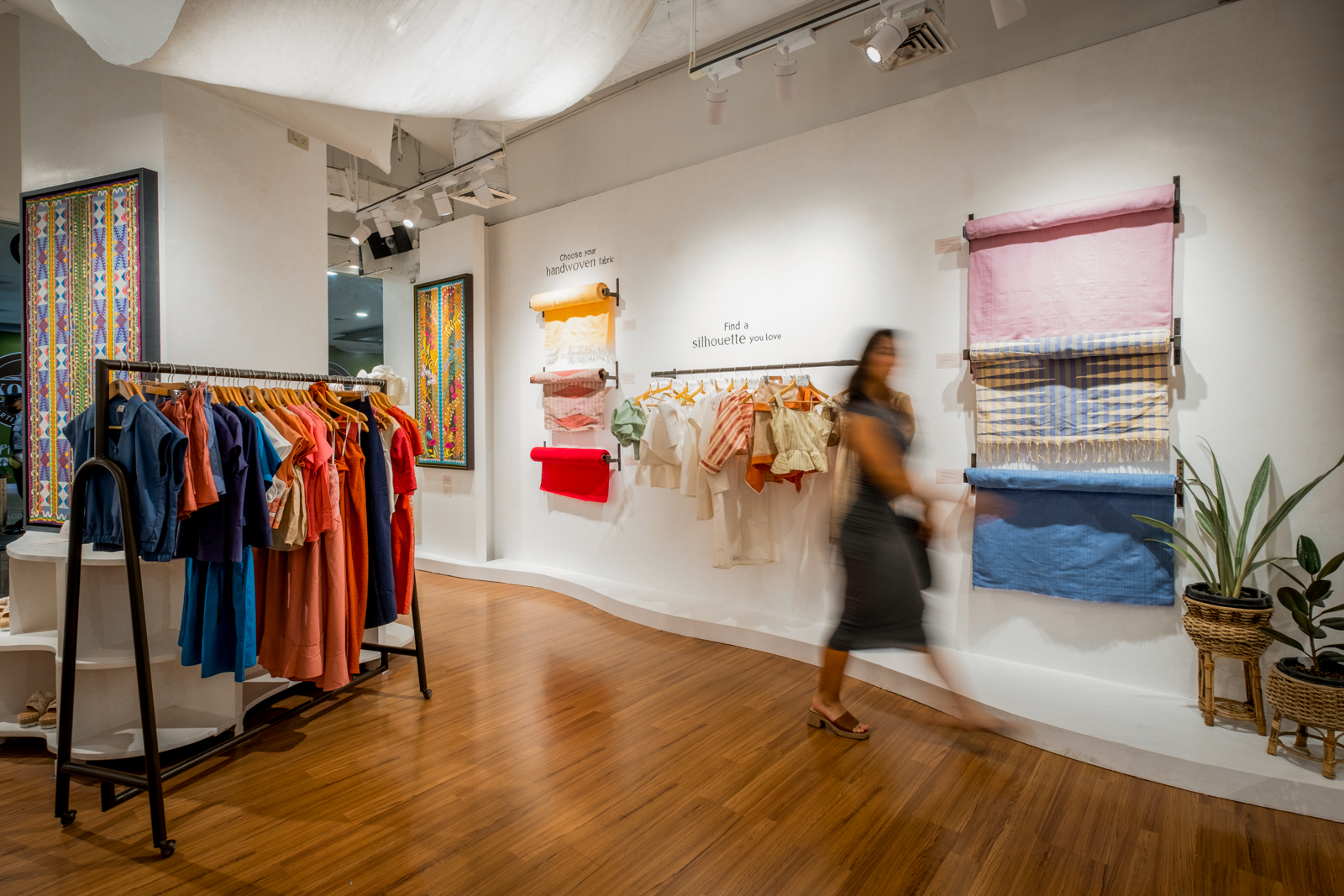
“This is how we envision the future of fashion, putting in consideration that mindset of choosing the right materials that is better for you, better for the future and the planet,” Lagon declares. “We’re using the concept of soil-to-garment, so our pieces come from locally farmed materials.
“We have these pieces here, we don’t just talk about the materials but we can show it, and we can encourage people to use it because it’s available. And so hopefully we can have this setup strategically located in areas where we can offer it.”
- u003cpu003eu003ca href=u0022https://vogue.ph/fashion/bayo-launches-a-hub-for-the-next-generation-of-weavers/u0022 target=u0022_blanku0022 rel=u0022noopeneru0022 title=u0022u0022u003eBayo Launches A Hub For The Next Generation Of Weaversu003c/au003eu003c/pu003e
- u003cpu003eu003ca href=u0022https://vogue.ph/fashion/bayo-ella-pangilinan/u0022 target=u0022_blanku0022 rel=u0022noopeneru0022 title=u0022u0022u003eMeet Your Sustainable Capsule Wardrobe: Bayo x Ella Collectionu003c/au003eu003c/pu003e
- u003cpu003eu003ca href=u0022https://vogue.ph/fashion/fashion-impact-fund-fashions-change-for-women/u0022 target=u0022_blanku0022 rel=u0022noopeneru0022 title=u0022u0022u003eHow The Fashion Impact Fund Is Fashioning Changeu003c/au003eu003c/pu003e
- u003cpu003eu003ca href=u0022https://vogue.ph/fashion/designer-profile/himaya-mariton-villanueva-natural-dyeing/u0022 target=u0022_blanku0022 rel=u0022noopeneru0022 title=u0022u0022u003eHimaya’s Mariton Villanueva Revives The Art Of Natural Dyeingu003c/au003eu003c/pu003e
